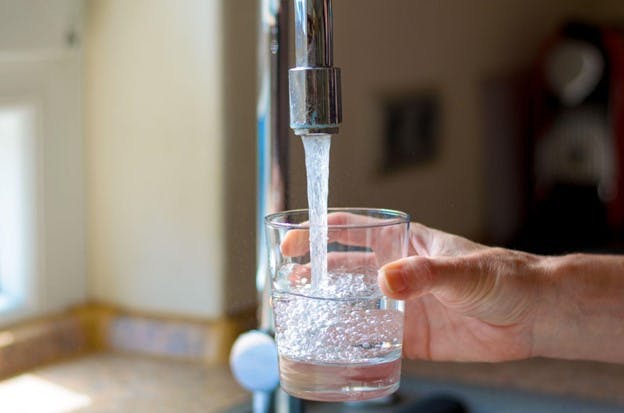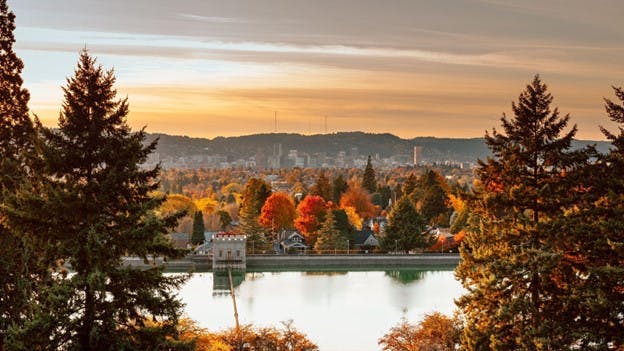March 2024
Is Portland Water Quality as Good as It Seems?
Located at the intersection of the Willamette and Columbia Rivers, Portland, Oregon is known for its abundant rainfall and pristine waterways where swimming, kayaking, and whitewater rafting are all at your doorstep. But how safe is its drinking water, and how does Portland water quality compare to other cities in the U.S.?
Whether you’re visiting Portland or moving there, here’s what you need to know about Portland water quality and whether you need to filter Portland tap water.
What Is the Source of Drinking Water in Portland, Oregon?
The City of Portland’s drinking water comes primarily from the Bull Run Watershed, a 102-square-mile area of protected rainforest located 26 miles east of the city. Natural springs and streams feed the Bull Run River, and two dams are used to collect and store drinking water — as many as 7 billion gallons in one of its reservoirs.
Portland’s climate means that while there’s plenty of precipitation during the winter and spring, summers can be hot and dry. The Portland Water Bureau monitors water levels and water quality to ensure that there’s enough drinking water year-round.
Despite its proximity to Mount Hood, the Bull Run Watershed doesn’t benefit from the spring snowmelt. Instead, it relies on 130 inches of annual rainfall.
The City of Portland has a second water source, the Columbia South Shore Well Field, which draws water from 25 wells across three underground aquifers. This groundwater is used when the Bull Run water system is running low or gets contaminated.
Is It Safe to Drink Tap Water in Portland, Oregon?
Portland’s tap water is widely considered some of the best in the country, and its drinking water quality is prized in the craft beer scene for its softness and purity. Many residents drink the tap water in Portland without worrying about health risks.
However, Portland’s tap water does have some differences compared to other water systems. Despite its high quality, water from the Bull Run Watershed isn’t filtered to remove microorganisms like cryptosporidium. Instead, the City of Portland uses a disinfection process to remove bacteria and viruses found in freshwater.
Additionally, the Bull Run Watershed can experience turbidity, or cloudiness caused by organic matter, especially after storms. When this happens, the Portland Water Bureau switches to groundwater, but the Columbia South Shore Well Field is located close to urban areas and has a higher risk of contamination.
In short, Portland tap water is generally safe to drink, but residents with specific health concerns should consider testing their tap water and installing a water filter.

Is Portland Tap Water Hard or Soft?
Portland’s tap water is usually soft. Water from Bull Run has a hardness of 3-8 parts per million (ppm), while groundwater from the Columbia South Shore Well Field measures around 80 ppm. This is due to its relatively low concentrations of minerals.
Hard vs. soft water doesn’t present any major health risks, so it’s more a matter of taste and appearance. Hard water can deposit residue on cookware and faucets, and even on clothing if you use it to do laundry. Residents of cities with hard water can benefit from installing a water softener — but this is generally unnecessary in Portland.
Does Portland Tap Water Have Fluoride?
Portland, Oregon is one of only a few major cities that doesn’t add fluoride to its water, but it does have some levels of naturally occurring fluoride. According to the 2023 Water Quality Report, fluoride levels ranged between 0.025 ppm and 0.15 ppm — much lower than the 4 ppm standard set by the Environmental Protection Agency (EPA).
Drinking water with fluoride is widely considered to prevent dental problems, especially in children — but using dental products with fluoride can make up for it.
If you choose to filter out fluoride from your tap water, you can use a reverse osmosis water filter or another home water filter that removes fluoride. Activated carbon filters remove chlorine and other water treatment byproducts, but don't remove fluoride.
Does Portland Tap Water Have PFAS?
Contaminants like PFAS — perfluoroalkyl and polyfluoroalkyl substances — are found in many parts of the country but have not yet been detected in Portland’s drinking water samples. These man-made chemicals are a major health risk and can contaminate the water supply in areas where they've been used for industrial purposes.
According to the annual water quality report, there are no industrial sites using PFAS in the Bull Run Watershed, but some areas near the Columbia South Shore Well Field are close to sites that have used PFAS in the past, such as the Portland Airport.
PFAS has only been found in shallow aquifers close to these sites and not in the deeper groundwater aquifers used for drinking. The City of Portland will continue testing for 29 different kinds of PFAS and monitor the test results to ensure safe drinking water.
If you want to be doubly sure of avoiding these “forever chemicals” in your water, you’ll need to use a reverse osmosis filter like this 4-Stage Under Counter Water Filter.
Does Portland Tap Water Have Lead?
As in many cities, elevated lead levels in the drinking water is a serious public health concern in Portland. According to Oregon Public Broadcasting (OPB), “Since the late 1990s, Portland has exceeded the federal safety threshold for lead 11 times.
The problem isn’t with the water supply itself, which doesn’t contain significant amounts of lead at the source. And it isn’t a problem with the distribution system, either: Unlike some cities, Portland has never used lead in its water mains or service lines.
Rather, the Water Bureau points to two sources of contamination that might result in lead levels higher than the federal lead action level of 15 parts per billion (ppb):
- Some faucets installed before 2014, which may have leaded brass
- Copper pipes installed before 1985, which may have lead solder
The Portland Water Bureau and the Oregon Health Authority have taken several steps to address the problem, including controlling the pH of the water with carbon dioxide and soda ash as part of the Optimized Corrosion Control Treatment.
Portland residents can request a free test kit to check their tap water for lead and use an NSF/ANSI 372 filter to remove lead from drinking water.

Does Portland Tap Water Contain Cryptosporidium?
Cryptosporidium is a parasite that can cause cryptosporidiosis, a waterborne disease that results in vomiting, cramps, dehydration, and other symptoms. Most people don’t need medical treatment to recover from it, but people who have a weakened immune system might experience more severe symptoms.
Until 2017, the risk of cryptosporidiosis from Portland tap water was minimal, and the Oregon Health Authority didn’t consider it necessary to filter Bull Run Water. After low levels of cryptosporidium were found in 2017, the OHA revised its policy. The Water Bureau plans to install a filtration system to remove cryptosporidium by 2027.
The risk of getting sick from Portland tap water is still low, but immunocompromised people should consider filtering their water as a precautionary measure.
Is It Safe to Swim in Portland Water?
Yes, it is generally safe to swim in Portland’s waterways, including the Willamette and Columbia Rivers — but swimmers should pay attention to water conditions and avoid swimming when pollutants are present.
According to Oregon.gov, the “20-year combined sewer overflow (CSO) control program … greatly reduced untreated waste to the Willamette River.” Since 2011, bacteria have mostly been found at low levels that are safe for swimming.
Still, sewage and pollutants can still make their way into the river, especially after heavy rain. Sign up for CSO alerts and “stay out of the water if it looks bright green, scummy or thick like blue green paint,” which could be a blue-green algae bloom.
What Contaminants Are Found in Portland Water?
Portland’s water may not be the highest-rated tap water in the U.S., but it’s certainly up there in terms of safety and quality. The Environmental Working Group (EWG) reports that Portland water has 14 contaminants, only 4 of which exceed their guidelines. The EWG’s recommendations are more stringent than the EPA, so that’s a good sign.
Still, those contaminants are worth a closer look:
Arsenic
Arsenic is a naturally occurring element that can be found in water supplies around the country, and can be more prevalent in industrial and agricultural areas. High levels of arsenic in drinking water can lead to arsenicosis, or arsenic poisoning.
According to the EWG, arsenic levels in Portland’s water are 0.420 ppb, which is lower than the legal limit of 10 ppb but higher than the EWG’s recommendation of 0.004 ppb. In fact, it exceeds this recommendation by 105 times.
Activated carbon filters like the HomeWater EZChange 2-Stage Under Counter Under Sink Water Filter are one of the best ways to remove up to 99.9% of arsenic.
Haloacetic acids
Haloacetic acids are a byproduct of the disinfection process, and are found in many municipal water supplies. They come in two groups: HAA5, for which the EPA sets a maximum limit of 60 ppb, and HAA9, for which there is no legal limit.
The EWG recommends a maximum of 0.1 ppb HAA5, and Portland’s water exceeds this by 310 times, with 31.0 ppb. It recommends a maximum level of 0.06 ppb HAA9, which Portland’s water exceeds by 510 times, with 30.6 ppb.
Total trihalomethanes (TTHMs)
Total trihalomethanes (TTHMs) are another group of cancer-causing chemicals that are a byproduct of disinfection. Portland’s water contains 25.7 ppb — lower than the legal limit of 80 ppb, but 171 times higher than the EWG’s recommendation of 0.15 ppb.

Should You Filter Portland Water?
Many residents drink Portland’s water straight from the tap, and frequent testing by the Portland Water Bureau ensures that it’s safe for most people to drink. Portland’s water is soft enough that you probably won’t need to filter it to improve the taste.
Still, the recent detection of cryptosporidium in the Bull Run Watershed, and concern over lead pipes, PFAS, and disinfection byproducts may make a Whole Home Water Filter a worthwhile investment for lifelong health and peace of mind.